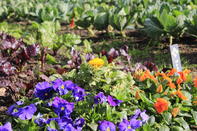Soil is the most important factor in organic cultivation. Before starting a vegetable garden it is necessary to improve the soil by adding organic material. Organic material helps the soil to keep moist for longer.

The soil drains well, water penetrates deeper and the soil holds moisture for longer, because there is more organic material in the soil. Root systems of plants develop better and deeper and helps to grow healthier plants.
Organic material and better soil penetration by roots which aerates the soil attracts earthworms that assists in the decomposition of organic material which add to soil fertility. More air in the soil supplies more oxygen to the roots which is available to plant roots for growth and respiration.
Prohibited materials in organic farming include fungicides or products to kill fungi (or mould) on seeds. In South Africa, all commercial seed are treated with fungicides to combat diseases and fungal infections in seedlings because there are fungi in the soils.
treatment is to protect the seed against the soil borne fungi. Traditional or indigenous seed should be used. If this is not available open pollinated seed varieties should be used.
Genetically Modified Organisms (GMO’s) are not allowed in organic agriculture. The organic producer needs to get a certificate from the supplier which states that no GMO seed has been supplied. This applies not only to seed, but also for seedlings and cuttings.
Preparing the Seed Beds

Before digging the trenches for your vegetable garden, you need to collect garden and kitchen waste for a few weeks. Add it a compost heap to decompose in until you have collected enough. This is then mixed (in layers) with the soil in your seedbed.
Your seedbed should not be larger than a door. Be sure to keep topsoil (darker) and subsoil apart; use the topsoil for filling the up the last bit of the seedbed. Some farmers may have larger sections of soil and would want to plant more vegetables to sell.
They can make a couple of beds, or beds can be longer than 2 m, but should never be wider than 1 m. Narrower beds are easier to water. It is easier to examine plants for pests and diseases and to weed the bed.
Plants can be easier and more effectively protected against animals and birds. If it is possible not to walk on the soil in the bed it will prevent compaction of the soil.
By Marinda Louw